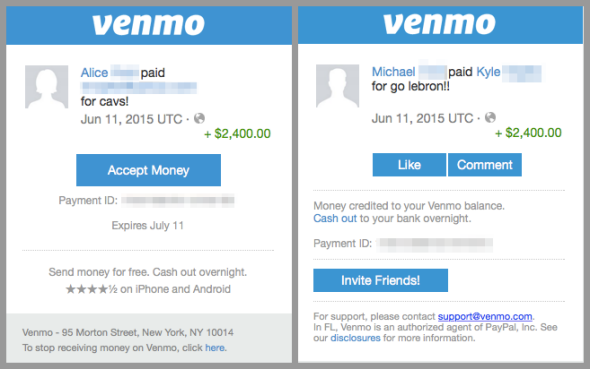This post originally appeared on Inc.
Bobak Emamian had just grabbed barbecue with friends in Austin on Monday night at South by Southwest and was using PayPal mobile payment processing app Venmo to settle the bill. “Classic thing where somebody pays with a credit card and we were just tallying it up,” he says. The topic arose of a upcoming happy hour in Brooklyn on Friday to celebrate Nowruz—Persian New Year. Someone mentioned hearing that Venmo wasn’t allowing transactions that referenced the festival or even the term Persian to go through.
Emamian, an entrepreneur active in the Persian-American community, decided to test the rumor. He typed “Persian Nowruz,” adding a confetti emoji, into the payment message. He received a message from Venmo on his screen: “It’s going to take us a bit longer than usual to process this payment, because your payment is pending review by our compliance team.” “It definitely … feels kind of weird,” says Emamian, CEO of Brooklyn-based iOS app developer Prolific Interactive.
This isn’t the first time users of Venmo or PayPal have complained about the services delaying payments that reference specific keywords. BuzzFeed reported last month that PayPal and Venmo were delaying donations to nonprofits that serve Syrian refugees when payment messages referenced Syria. And in a case reported by Valleywag in 2014, a woman’s account was frozen after she used the name “Ahmed” in text accompanying a payment.
Inc. also noticed the word Persian resulted in blocked payments on both Venmo and PayPal. In response to an inquiry, a representative of MSL Group—the public relations firm representing PayPal and its Venmo service—directed Inc. to a post published to Venmo’s blog Sunday.
“There has been recent discussion around specific keywords associated with payments within Venmo that have caused us to pause the transaction and review. We understand the frustration this may cause, and it’s important to us to take the time to address your concerns,” reads the post, referencing U.S. Office of Foreign Assets Control sanctions. “It’s our obligation to comply with government regulations, but also to ensure this is a smooth process for all our users. We appreciate your patience and apologize for any inconvenience as our teams work hard to get this up to the service level that you deserves.”
Some are questioning whether Venmo and Paypal are acting in too heavy-handed a fashion. At nonprofit National Iranian American Council, policy director Jamal Abdi says: “I don’t envy these companies for having to deal with these injunctions.” But while he understands certain terms being flagged for security reasons, he considers PayPal’s apparent decision to flag a relatively generic term like Persian to be discriminatory. “In this case they’ve clearly sort of erred on the wrong side of this,” Abdi says.
PayPal has cited OFAC sanctions against Syria in explanations to BuzzFeed of why those particular donations were held. But Abdi says that issue is different, as there are restrictions when it comes to U.S. donations to certain Syrian refugee organizations. But holding payments that use the term Persian “sort of veers off into territory where you’re not talking about a country,” he says.
A post on Abdi’s organization’s blog Friday includes a screenshot of an apparent Venmo response on March 8 after a user named Hooman reportedly sent a payment with the text: “Persian Nowruz submersion session. Scary stuff.” The payment had been held. In the screenshot, the Venmo explanation states that the purpose of the review is to assure compliance with OFAC regulations:
We’re trying to understand:
- your reference to ‘Persian’
- the purpose of this payment, including a detailed explanation of what you intended to pay for and the establishment/location, if applicable.
When Inc. tested Venmo and PayPal for holds on payments, both services placed holds on payments that used the term Persian but not on payments with text like Nowruz or alternate spelling Norooz. For Emamian, the holding of payment by Venmo was cause for a double take. He says he and his friends were joking around and didn’t expect Venmo to actually stop a transaction from going through. While security could be a legitimate reason, in general, for such a response, “it just kind of feels weird,” he says. “It’s hard to tell Venmo’s stance on it.”
See also: Why Is Dropbox Leaving Amazon’s Cloud Just as Netflix Is Moving In?
